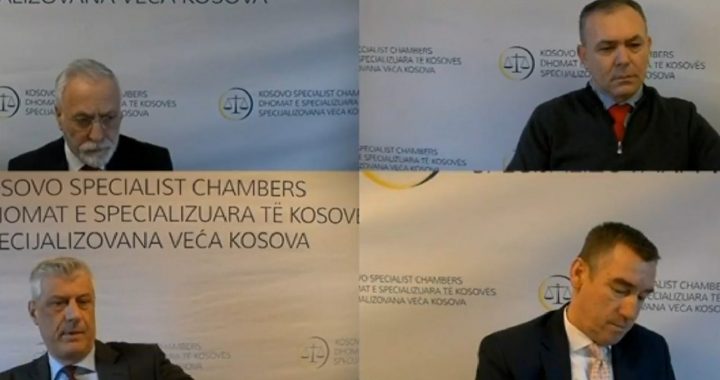

 Former Kosovo Liberation Army leaders in court on Monday. Photo: Kosovo Specialist Chambers/Screenshot.
Former Kosovo Liberation Army leaders in court on Monday. Photo: Kosovo Specialist Chambers/Screenshot.
Prosecution witnesses’ testimony in the war crimes trial of former Kosovo President Hashim Thaçi and his three co-defendants could take over six years, judges in The Hague warned.
The prosecution’s presentation of evidence in the case against former Kosovo President Hashim Thaçi and three other former senior Kosovo Liberation Army, KA guerrillas at the Kosovo Specialist Chambers in The Hague could go on for six-and-a-half years, presiding judge Charles Smith III told a case status conference at the court on Monday.
“The judges’ panel estimates that… we would hear around 46 [prosecution] witnesses per year,” Smith said.
He explained that as there are 312 prosecution witnesses, “including counter-questions from the defence, it would take six-and-a-half years to finish them”.
The testimony of the first 12 witnesses will take 234 hours, “which is more than 35 days in court”, meaning that they will be testifying until September or October 2023, Smith said.
The judges called on the prosecution and defence to find ways to reduce the length of the hearings.
The prosecution claimed it had already cut 150 hours of direct questions and removed 11 witnesses. But in order for it to evaluate whether they can further reduce the time that witness hearings will take, the first witnesses must be heard because they will give very important evidence, it insisted.
This evidence includes KLA communiques whose authenticity is being disputed by the defence.
“After we present the first evidence with the first witnesses, we can adjust based on needs the moment we consider [the communiques’ authenticity] proved,” the prosecution said.
Thaci will go on trial on April 3 alongside Kadri Veseli, a former Kosovo parliament speaker and leader of Kosovo Democratic Party, PDK, Jakup Krasniqi, the former chairman of the national council of the Social Democratic Initiative, NISMA party, and Rexhep Selimi, the former head of the parliamentary group of the Vetevendosje party.
The indictment alleges that as part of a “joint criminal enterprise”, the four men committed war crimes and crimes against humanity between at least March 1998 and September 1999, and bear criminal responsibility for nearly 100 murders.
The indictment says they sought to stamp their control over Kosovo “by means including unlawfully intimidating, mistreating, committing violence against, and removing those deemed to be opponents”.
It alleges that as senior figures in the KLA guerrilla force, they had “superior responsibility” which makes them complicit in war crimes and crimes against humanity because they were allegedly aware of violations but did not take action to prevent criminal acts or punish the perpetrators, or they directly participated in the crimes themselves or gave orders for them.
The Specialist Chambers are part of Kosovo’s judicial system but are located in the Netherlands and staffed by internationals.
They were set up in 2015 by the Kosovo parliament, acting under pressure from the country’s Western allies, who believe Kosovo’s own justice system is not robust enough to try KLA cases and protect witnesses from intimidation, after previous trials at the Yugoslav war crimes tribunal were marred by witness-tampering.
The so-called ‘Special Court’ is highly unpopular in Kosovo, where it is seen as unfairly targeting Kosovo Albanian freedom fighters rather than the Serbian perpetrators of the majority of the war crimes that were committed in 1998-99.
20 March 2023 - 14:31

At the close of their trial in The Hague, the four former Kosovo Liber...

The defence for the four former Kosovo Liberation Army leaders said in...

Kosovo ex-President Hashim Thaci's defence said during closing stateme...

In closing statements, prosecutors said that ex-president Hashim Thaci...